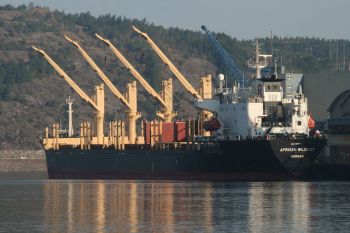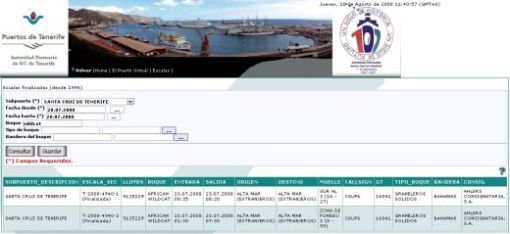In August Yara's plant on Herøya imported phosphate from occupied West Sahara, contrary to the advice of the Norwegian Ministry of Foreign Affairs. Yara may have paid 4,3 million euros to a Moroccan state company for phosphate stolen from its occupied neighbour.
(First published in Norwegian 27 August 2008)
By Erik Hagen
Norwatch
See story on Norwatch homepages here.

See also: The Norwegian government knew about the trade. The political leaders of the Ministry of Trade and Industry knew about the trade several weeks before it occurred. They failed to protest.
Today Norwatch can reveal that the partly state-owned fertiliser company Yara has recently violated the Norwegian authorities clear advice against trade in goods from Western Sahara.
Mineral-rich Western Sahara is occupied by Morocco, and trade with goods from the occupied area is considered by Norwegian authorities to possibly be contrary to international law; moreover, it provides unwanted and unethical support to Moroccos occupation policy.
Western Sahara has one of the world's most important phosphate deposits, but this industry is of no benefit to the people of Western Sahara, the Sahrawi. Their right to the territory and its natural resources is ignored by Morocco and by Moroccos foreign phosphate customers. The Norwegian fertiliser company Yara is one of them.
The controversial cargo took place in July. The ship reached Yara's port facilities on Herøya, outside the city of Porsgrunn, Norway, on 30 July this year. The big bulk carrier was anchored alongside the pier at Herøya right through to 6 August. Norwatch has obtained a photograph (above) showing the ship anchored alongside Yaras plant, in the process of unloading the phosphate.
From what Norwatch has discovered, 16,800 ton phosphate was unloaded from the ship during the 7 days it was in harbour. At a phosphate price of US$ 425 per ton, this means that Yaras import was worth about 4,34 million euros.
The money has gone right into the pockets of the Moroccan state phosphate company, OCP, which is behind the mining industry in the occupied country.
When Morocco moved into Western Sahara in 1975, the majority of the Sahrawi fled to refugee camps in Algeria. Most of the Sahrawi phosphate labourers who remained lost their jobs when the Moroccan authorities took over the phosphate plant. Today the OCP phosphate companys plant in Western Sahara is almost totally manned by Moroccan settlers. A UN evaluation from 2002 concludes that such industry is in conflict with important UN conventions.
Yara has confirmed the cargo and said it was for test purposes. “I can confirm that we have imported one phosphate cargo. We are not about to start importing phosphate originating from Western Sahara. This is a single shipment, which is to be used to test our new plant at Porsgrunn,” Bente Slaatten, public relations officer at Yara, told Norwatch.
See more of Yaras comments here.
Promised to Stop
It is only 3 years since Yara promised that they would not import from Western Sahara.
“Under the present circumstances we feel that it is right to avoid buying phosphate originating from Western Sahara,” Yara said in 2005. At that time the company admitted that, a few years earlier, they had imported such phosphate.
In connection with the 2005 episode, during the previous Norwegian administration, the Ministry of Trade and Industry (NHD) criticised Yara.
“We have taken note of this matter and have seen that Yara has stopped trade with the area. We assume that Yara will keep to the guidelines that the Ministry of Foreign Affairs has set up for trade with this area,” Arvid Samland, public relations adviser in the Ministry of Trade and Industry, told dn.no at that time.
The Ministry of Foreign Affairs has advised against this trade for several years, for political and ethical reasons and reasons pertaining to international law. “This trade is contrary to the guidelines to which the UN and Norway are committed. We have been extremely clear with regard to our stand, but we have no sanction possibilities with regard to Norwegian companies,” Eirik Bergesen, public relations adviser in the Ministry of Foreign Affairs, said.
The Ministry of Foreign Affairs has since then published the advice on its web pages.
Gross Breach of Ethics
Norwegian policy in Western Sahara became very clear in June of 2005, when the Norwegian Government Pension Fund - Global sold its NKR 337 million (38 million euro) shareholding in the American petroleum company Kerr-McGee. The company was exploring for petroleum in the occupied areas on behalf of Moroccan authorities. Per Kristian Foss, then Minister of Finance, was therefore the first to announce an exclusion from the Fund for ethical reasons. “Morocco has for years, despite strong denunciation by the UN, occupied Western Sahara. In the opinion of the Advisory Council on Ethics, Kerr-McGee enables Morocco's possible exploitation of the natural resources in the area. The Council considers such activity an especially gross breach of fundamental ethical norms because, among other things, this can contribute to legitimising Morocco's sovereignty claims and thus undermine the UN's peace process,” the press release from Foss states.
A year later, when a handful of other Scandinavian shareholders also had thrown out their shares in Kerr-McGee, the petroleum company finally announced that it would discontinue its activity in Western Sahara.
To influence Yara's business ethics, however, seems to be impossible for the Ministry of Trade and Industry, even though it owns a total of 36.2% of the shares. Moreover, 4.9% of Yara is owned by the government's National Insurance Fund. (See separate case.)
Concludes Transports
The revelations about Yaras phosphate import come shortly after three Norwegian shipping companies announced that they do not wish to participate in the trade for ethical reasons.
The Bergen-based shipping company R-Bulk was caught red-handed in April, when one of its ships had transported phosphate from the occupied country to Columbia. “We have of course taken this up with the shipping company that leased the ship, so that they will do their utmost to prevent this from happening in the future,” R-Bulk's chairman of the board told the National Broadcasting Corporation (NRK) in Hordaland.
“We are located in Asia and admit that we knew nothing about Western Sahara. We have only had a single charter. But now that we have become aware of the Western Sahara issue, we won't take on new contracts for assignments there,” Raymond Ching, vice president of Oslo Stock Exchange-listed Jinhui Shipping, told the leading English-language newspaper South China Morning Post on 11 May 2008. Jinhui withdrew from the assignments after Norwegian insurance compnay Storebrand had taken the case up with the shipping company and after Norwatch had reported the involvement.
In November 2007 the Farsund-based shipping company Arnesen Shipbrokers informed NRK that it would do likewise.
Undernourished
Yaras import is far from insignificant. The estimated value of the cargo, 4,34 million euros, is equivalent to 25% of the total multilateral aid that reached the refugee camps in Algeria in 2007.
Every year the UN's High Commissioner for Refugees begs for increased aid for the Sahrawi refugee population. According to a report from Norwegian Church Aid, 19% of the children in the camps are seriously undernourished. The food situation in the camps is thus worse than in Darfur, where the percentage is 16. That it is the Sahrawi people who, according to international law, have the right to the enormous phosphate deposits is of little help. Morocco has had control of the mines since it bombed and invaded its neighbour to the south.
Yara's single phosphate import in August this year is worth 12 times as much as Norway gives in aid to the refugees yearly, via Norwegian Church Aid. This organisation is one of the most important participants in the refugee camps in Algeria.
Via the Canary Islands
‘African Wildcat’ picked up the phosphate in Western Sahara on 21 July. From there it went straight to Tenerife in the Canary Islands, where it arrived the night before 23 July. (See the printout from the port records of Tenerife below.
After Yara had finished being unloaded for phosphate at the port facilities at Herøya, the ship set out for Klaipeda, Lithuania. It arrived there on 8 August, perhaps with the last part of the cargo. The vessel was built in 1997 and belongs to a Greek shipping company named Enterprises Shipping & Trading.

NY Check new Western Sahara poster!
“Try to Visit Western Sahara”…
The Security Council fails Western Sahara and international law
On 31 October 2025, a new resolution was adopted in the UN Security Council calling on the Saharawis to negotiate a solution that would entail their incorporation into the occupying power, Morocco.
Saharawis Demonstrate Against Trump Proposal
The United States has proposed in a meeting of the UN Security Council on Thursday that the occupied Western Sahara be incorporated into Morocco.
Skretting Turkey misled about sustainability
Dutch-Norwegian fish feed giant admits using conflict fishmeal from occupied Western Sahara. Last month, it removed a fake sustainability claim from its website.



